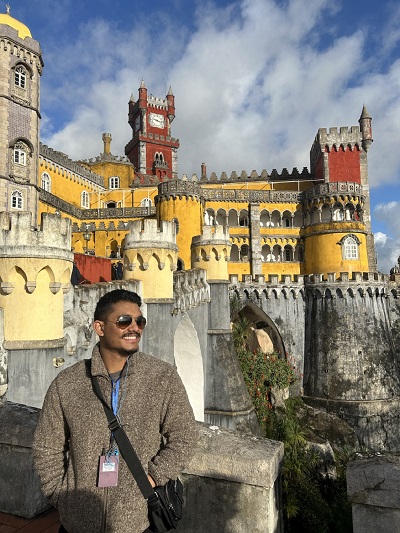Gayan Ferdinands is an MBA ’24 candidate and section representative of the Ivey MBA Association. He recently travelled to Portugal for the Ivey MBA International Study Trip. In his blog below, he discusses his experiences working with a sustainable fish farm and learning about cork production – all while enjoying the local food and wine.
Portugal – The growing economy
Visiting Lisbon, Portugal for the MBA International Study Trip was both a life-changing and exhilarating experience. I had not previously travelled to Portugal and, quite frankly, didn’t know what to expect when I landed there. I had known Portugal was popular for football, exporting arguably one of the greatest players of the sport: Cristiano Ronaldo. I was also aware it was well-known for its diverse food culture. I was excited to visit Lisbon, which is the second-oldest European capital city, and gain more insight into its growing economy – all while sipping on Vinho Verde (Portuguese wine) and tasting some of the best seafood the world has to offer. Since Portugal is a member of the European Union, I expected it to be developed and thriving. Prior to the study trip, however, we were tasked with researching various aspects of its economy. I learned the Portuguese economy is struggling and making attempts to improve in the coming years. Based on my learnings, I was even more curious to travel to the country and find out exactly what initiatives were in place to foster this growth.
Lessons on being an international consultant
 While on the trip, we had to consult with a local company named Aquaponics Iberia, which focuses on sustainable fish farming. We were tasked with helping the company introduce a foreign species of fish into the Portuguese market. Prior to the trip, my teammates and I had little to no experience in this field. In addition, we learned Portugal has the highest seafood consumption in Europe and the Portuguese people typically only consume locally caught seafood. Convincing them to adopt a new fish species into their diet was certainly going to be an uphill battle. To gain insight, we had to gather tangible data and feedback before proposing any solutions. Once arriving in Portugal, we created opportunities to engage with the locals – from diners to restaurant staff – to gauge their potential interest in a new product. The feedback we gathered was eye-opening and provided us with a baseline to plan on how to tackle the problem for our client. I learned about the importance of conducting strong market research and familiarizing yourself with the current ecosystem. You must first be in line with your audience and cognizant of the environment that you are working in before proposing any improvements or change. This experience gave me valuable insights that I could take into my career moving forward. It taught me the importance of spending the effort and energy to engage with your audience to better understand the market you are servicing.
While on the trip, we had to consult with a local company named Aquaponics Iberia, which focuses on sustainable fish farming. We were tasked with helping the company introduce a foreign species of fish into the Portuguese market. Prior to the trip, my teammates and I had little to no experience in this field. In addition, we learned Portugal has the highest seafood consumption in Europe and the Portuguese people typically only consume locally caught seafood. Convincing them to adopt a new fish species into their diet was certainly going to be an uphill battle. To gain insight, we had to gather tangible data and feedback before proposing any solutions. Once arriving in Portugal, we created opportunities to engage with the locals – from diners to restaurant staff – to gauge their potential interest in a new product. The feedback we gathered was eye-opening and provided us with a baseline to plan on how to tackle the problem for our client. I learned about the importance of conducting strong market research and familiarizing yourself with the current ecosystem. You must first be in line with your audience and cognizant of the environment that you are working in before proposing any improvements or change. This experience gave me valuable insights that I could take into my career moving forward. It taught me the importance of spending the effort and energy to engage with your audience to better understand the market you are servicing.
Seeing sustainable cork production in action
It was fascinating to learn that Portugal produces more than 60 per cent of the world’s cork. During our stay, we were fortunate enough to visit Companhia das Lezírias, which is the largest state-owned farm in Portugal and is famous for producing wine, olive, and cork. Back home in Canada, I love having a glass or two of red wine weekly and always wondered how the cork for the wine bottles is manufactured. To my surprise, we were taken to a vast cork oak forest, where we got to see samples of the cork tree that had been stripped of its bark to then be used for cork production. I learned how sustainable and environmentally friendly the whole process is. Cork trees are not actually cut down for cork production, but rather the bark is stripped from the tree to harvest the cork. The tree continues to live and grow, producing more bark for harvesting, while the byproducts are easily recycled. Once the bark is stripped, it will take nine years, on average, before the tree can be harvested again. Visiting the farm was such an informative experience and truly gave me more insight into one of the key drivers of the Portuguese economy. That experience was so influential that it even inspired me to later that day purchase a handbag made from cork for my girlfriend.


